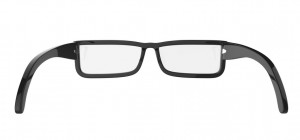About a week ago, Google (GOOG) seemed to face a tense moment in the development of its high-profile Google Glass wearable computer. Call it Peak Glass Cynicism.
Some of the device’s earliest fans were questioning Google’s devotion to the product. Bars were banning it, citing the device’s surreptitious integrated camera. Bloggers were ridiculing it. In a sign that the mounting criticism was worrying the search giant, Google e-mailed journalists with “the top 10 Google Glass Myths.” Number three: “Glass Explorers are technology-worshiping geeks” the e-mail read. “Our Explorers come from all walks of life.”

On March 24, Google struck a deal that may quell, for the time being, some of the nervousness concerning Glass. The company said it was joining forces with Luxottica (LUX), a quiet giant in the eyeglasses world whose brands you have undoubtedly heard of—as in Ray-Ban, Oakley, Persol, and Oliver Peoples. The financial terms weren’t disclosed. Nor were prices or release dates. But the basic idea is that Luxottica will help integrate Glass into its products and sell the device through its wholesale and retail outlets.
The deal is a crucial step for Google and its fledgling genre of head-mounted wearable computers. Google hasn’t merely been trying to build a new consumer product, it is aiming to start a revolution in how we interact with our devices and one another. The company has been trying to pull this off at the worst possible time, just as people started to reconsider notions of privacy in the wake of Edward Snowden and his revelations around the NSA. “Google sat in a precarious position,” says J.P. Gownder, an analyst at Forrester Research who specializes in wearable computers. “Even before they rolled the product out on a large scale, they already faced incredible social blowback, stigma, and privacy concerns.”
The deal with Luxottica will show the developer community and Google-watchers that Glass has a path to the consumer market. Luxottica has 7,000 retail outlets around the world, a far larger footprint than fashionable online retailer Warby Parker, with which Google reportedly discussed a partnership.
Google also will get much-needed help in considering how to integrate the device into fashion and social norms. “This is a fashion problem as much as it is a technology problem,” Astro Teller, chief of Google’s X Lab, told the Wall Street Journal.
Last year, Google struck a similar deal with vision-care insurer VSP Global, whose network of 30,000 optometrists in the U.S. will be able to sell prescription lenses and frames fitted with Glass. With these two announcements out, Google is probably hoping critics will start to see the promise of head-mounted computers a little more clearly.
(Image Source: iCLIPART)
